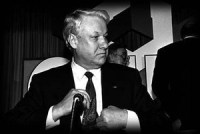Chronology of Boris Yeltsin's career
The chronology of Boris Yeltsin's career:

1976 - Named senior party official of the Ural Mountains region of Sverdlovsk, making him boss of one of the Soviet Union's key industrial areas.
1985 - Soviet leader Mikhail Gorbachev brings Yeltsin to Moscow and puts him in charge of construction for the nation. Named party chief for Moscow.
October 1987 - Complains at closed Communist Party Central Committee meeting about slow pace of economic reforms.
November 1987 - Fired as Moscow party chief, hospitalized with heart condition.
Feb. 18, 1988 - Dropped from Politburo.
March 26, 1989 - Makes stunning comeback in election to Soviet Parliament.
September 1989 - Newspapers report Yeltsin drinks heavily during first U.S. visit; aides blame jet-lag and sleeping pills for his unsteadiness.
May 1990 - Elected chairman of the Russian parliament, effectively making him president of Russia. Later quits Communist Party.
June 1991 - Wins Russia's first popular presidential election.
Aug. 18, 1991 - Hard-liners attempt a coup against Gorbachev. Yeltsin famously defies coup while standing on a tank.
Aug. 21, 1991 - Coup attempt collapses. Yeltsin emerges as the country's most powerful and popular politician.
Dec. 8, 1991 - Yeltsin, and leaders of Belarus and Ukraine, declare Soviet Union extinct.
Dec. 25, 1991 - Gorbachev resigns.
January 1992 - Yeltsin begins to dismantle 75 years of Communist policies by lifting price controls on most goods.
Oct. 3, 1993 - Yeltsin declares state of emergency in Moscow after supporters of hard-line parliament overwhelm riot police, seize government buildings.
Dec. 12, 1993 - New constitution approved giving Yeltsin sweeping powers and guaranteeing private property, free enterprise and individual rights.
Dec. 11, 1994 - Yeltsin sends troops into Chechnya to quash independence bid.
July 11, 1995 - Hospitalized with heart disease. Sets parliamentary election date for December 1995.
October 1995 - Yeltsin again hospitalized with heart trouble.
July 3, 1996 - Yeltsin wins re-election despite disappearing from public view for final week before the vote. Aides cite a sore throat, though it later proves to be a renewed bout of heart trouble.
Sept. 5, 1996 - Yeltsin says he will undergo heart surgery, ending months of secrecy about his health but raising new concerns about his ability to govern.
Nov. 5, 1996 - Yeltsin undergoes heart surgery after temporarily transferring power to Prime Minister Viktor Chernomyrdin.
Jan. 8, 1997 - Yeltsin is hospitalized with double pneumonia and remains away from his office for several weeks.
March 23, 1998 - Yeltsin fires the Cabinet and chooses little-known technocrat Sergei Kiriyenko as prime minister.
Aug. 23, 1998 - Yeltsin ousts Kiriyenko, days after his Cabinet defaulted on some debts and devalued the national currency, setting off an economic crisis. Yeltsin proposes reinstating Chernomyrdin.
Sept. 10, 1998 - After two parliament rejections of Chernomyrdin, Yeltsin nominates Foreign Minister Yevgeny Primakov as prime minister.
Oct. 27, 1998 - Yeltsin cancels or cuts short, several foreign trips and enters a rest home to recuperate from what is described as high blood pressure and exhaustion.
Feb. 18, 1999 - Parliamentary panel finalizes impeachment charges against Yeltsin.
May 12, 1999 - One day before impeachment hearings in parliament, Yeltsin fires Primakov, and names Interior Minister Sergei Stepashin as a replacement.
Aug. 9, 1999 - Yeltsin fires Stepashin and names Vladimir Putin, the head of the Federal Security Service, the acting prime minister. The president also says Putin is his preferred successor.
Sept. 30, 1999 - Russia sends ground troops into Chechnya, launching Russia's second war against the breakaway republic.
Dec. 31, 1999 - Asking forgiveness for his mistakes, Yeltsin announces his resignation. Putin becomes acting president, and is later elected president.
Dec. 8, 2000 - The newspaper Komsomolskaya Pravda reports that Yeltsin criticizes Putin for reintroducing the music to the old Soviet anthem. Yeltsin had discarded the anthem soon after the 1991 dissolution of the Soviet Union.
Jan. 30, 2001 - Yeltsin hospitalized with suspected viral infection.
Sept. 16, 2004 - Yeltsin criticizes Putin for ending the direct election of governors, which Putin proposed after the bloody end of the school siege in Beslan.
Sept. 7, 2005 - Yeltsin undergoes hip surgery after breaking a leg while on vacation in Sardinia.
Jan. 30, 2006 - Yeltsin, in a rare interview with the newsweekly Itogi, defends his choice of Putin as his successor, saying without a "strong hand" the country would disintegrate.
April 23, 2007 - Yeltsin dies.
Subscribe to Pravda.Ru Telegram channel, Facebook, RSS!


